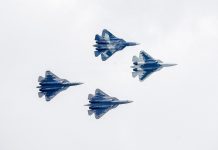Indonesia is resolutely engaging in South Korea’s KF-21 Boramae advanced jet fighter program, even though it has frequently failed to meet the payment deadline.
According to a report from Janes, which references a source from PT Dirgantara Indonesia (PTDI), an Indonesian state-owned aircraft manufacturer, Indonesia’s commitment to South Korea’s KF-21 Boramae 4.5 generation fighter program remains steadfast, despite failing to meet a payment deadline for the project.
The source, who chose to remain anonymous, revealed that Indonesia had paid 21% towards its cost share until June 2023.
However, there is no definitive timeline yet for the release of the payment plan for 2024-2026 by the Indonesian Ministry of Defense. In the meantime, PT Dirgantara Indonesia (PTDI) has outlined its intention to contribute 32% of the cost-share payment through its own plans.
On the other hand, on July 3, the South Korean Defense Acquisition Program Administration (DAPA) stated that Indonesia had not yet submitted its plans for the new payment, prompting discussions between the two countries to address the issue.
DAPA is reportedly formulating its response, which may involve arranging high-level meetings with Indonesian officials.
DAPA has expressed its commitment to ongoing discussions with the Indonesian government to address cost-sharing concerns and reinstate the project on its intended course.
Jakarta had agreed to contribute approximately $1.2 billion, which is 20% of the total expense of $6.2 billion, for the engineering and manufacturing development phase of the project led by Korea Aerospace Industries (KAI).
But the suspension of payments by Indonesia from January 2019 until their resumption in November 2022 has prompted doubts regarding its dedication to the advanced warplane development project initiated in 2015.

As part of the joint engineering and manufacturing development (EMD) agreement between Indonesia and South Korea, the scheduled transfer of the single-seat “KF-21 prototype no 5” to Indonesia is planned.
Yet, in April 2023, it was reported that Indonesia would receive a KF-21 prototype once it met its financial obligations stipulated in the agreement.
Speaking to EurAsian Times, Shashank S Patel, an analyst closely following the dynamic geopolitical landscape of East Asian countries, said, “Cash-strapped Indonesia already dropped South Korea in its submarine program earlier as a primary partner due to payment difficulties, but the trajectory in the jet program will find its course of succession.”
He pointed out that the primary reason for Indonesia’s delayed payment problem stems from various factors, such as decreased agricultural productivity, the economic impact of COVID-19, a significant decline in exports by over 25%, and a decrease in domestic demand.
With the recent growth of international supply chains over the past year, Patel expressed hope that Indonesia’s exports would experience a notable growth of over 15%.
This positive development would contribute to increased investments in the country and pave the way for Indonesia to initiate DAPA-KAI consultations regarding payment methods and timeframes in the near future.
Can Indonesia Sustain Its Involvement In The KF-21 Project?
The latest report highlights Indonesia’s strong determination to proceed with the KF-21 project, emphasizing its commitment to modernizing the Indonesian Air Force (IDAF).
The project signifies Indonesia’s aspiration to enhance its air defense capabilities and advance its military aviation sector.
The Indonesian Air Force (IDAF) has sought to augment its airspace coverage and address security needs. The IDAF operates a fleet of roughly 49 fighter aircraft, including F-16s, Su-30s, and Su-27s, with the Su-30 as the primary fighter.
Indonesia was earlier considering Russia’s Su-35, but the threats of US sanctions led it to explore alternatives. Washington offered F-15EX fighters, but concerns over price and potential restrictions prompted Indonesia to opt for French-made Rafales.
Recently, the country also inked an agreement to acquire a fleet of old Mirage-2000 fig ter jets from Qatar. Indonesia’s commitment to the KF-21 project stems from its aspiration to modernize its air force.
Patel emphasized that the advanced Gen-4.5 fighter jet is a significant asset within South Korea’s New Southern Policy, with the Korea Aerospace Industries (KAI) aiming to establish it as a robust pillar in the defense domain.
:quality(70)/cloudfront-us-east-1.images.arcpublishing.com/archetype/S5M7BYWEC5HWTGOIO5RPIMKDOM.jpg)
Patel added that several countries, including Poland, the UAE, and other European nations, have shown interest in becoming potential buyers of this cutting-edge aircraft. These countries actively seek to participate in the project at different levels and under exclusive terms.
The exclusive deal between Indonesia and South Korea will remain strong, with KAI-IDAF working to resolve financing issues, as South Korea values Indonesia as its most promising buyer, aiming to procure over 40 jets, according to Patel.
He concluded, “Another reason Indonesia will not leave this deal as there is no better option in price, capabilities & independent usage policy globally at this price range. Also, Indonesia took lessons from its neighbors that full control over defense capabilities & technological advancements is the key to secure strategic freedom in this global security framework.”
Furthermore, the project would deliver a capable fighter jet that would complement the French Rafale fighters, bolstering the country’s security.
Thus, despite the ongoing concern over delayed payments, Indonesia, as the sole co-development partner of the KF-21 project, remains dedicated to its commitment, assuring that participation will continue and that efforts are being made to address the payment issues.
- Contact the author at ashishmichel(at)gmail.com
- Follow EurAsian Times on Google News




